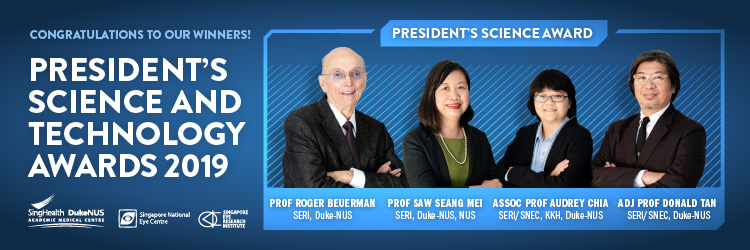Congratulations to our President's Science and Technology Awards Winners 2019
The President's Science and Technology Awards (PSTA) is the highest honour bestowed on exceptional research scientists and engineers in Singapore whose work have resulted in significant scientific, technological or economic benefits for the country. The winners were picked by a distinguished panel of representatives from industry, academia and research.
This year, the SingHealth Duke-NUS Academic Medical Centre is proud to have a SERI/SNEC - Duke-NUS team receive the President's Science Award:

President's Science Award recipients
For leading clinical research and combating myopia in Singapore and beyond
Assoc Prof Audrey Chia
Co-Head, Myopia Research, Singapore Eye Research Institute
Co-Director, Myopia Centre @ Bedok, Singapore National Eye Centre
Head, Paediatric and Strabismus Service, Singapore National Eye Centre & KK Women and Children's Hospital
Vice-Chair, Faculty and Professional Development, and Associate Professor, SingHealth Duke-NUS Ophthalmology & Visual Sciences Academic Clinical Programme
Prof Saw Seang Mei
Co-Head, Myopia Research, Singapore Eye Research Institute
Professor, Saw Swee Hock School of Public Health, National University of Singapore
Joint Professor, Duke-NUS Medical School
Prof Roger Beuerman
Senior Scientific Advisor, Singapore Eye Research Institute
Professor, Programme in Neuroscience and Behavioural Disorders and Programme in Emerging Infectious Diseases, Duke-NUS Medical School
Professor, SingHealth Duke-NUS Ophthalmology & Visual Sciences Academic Clinical Programme
Adjunct Prof Donald Tan
Senior Scientific Advisor, Singapore Eye Research Institute
Visiting Senior Consultant, Singapore National Eye Centre
Adjunct Professor, SingHealth Duke-NUS Ophthalmology & Visual Sciences Academic Clinical Programme
Senior Partner, Eye & Retina Surgeons, Camden Medical Centre
The team from SERI is recognised for their pioneering work in the field of myopia research that has contributed to a decrease in the prevalence and severity of myopia in children over the last three decades.
The team carried out translational research and clinical trials that established the role of low-dose atropine in controlling myopia in young children, as well as epidemiological studies that have led to practical recommendations for better eye health. Both strategies have contributed to decreasing the severity of myopia in children.
The SERI team was the first to identify low-dose atropine eyedrops as a viable treatment option that is both safe and effective for long-term use in children. This work has triggered many other interventional trials globally. This led SERI to develop its own eye drops to reduce the development and progression of myopia and this is now available in many countries.
The team also developed the FitSight watch that encourages children to spend more time outdoors, as studies have shown that this is effective in reducing the occurrence of myopia. The team's work has impacted education, clinical care, optometry guidelines, clinical interventions and preventive measures, leading them to be recognised as an international leader in myopia research.
